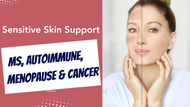Sensitive Skin Support for MS, Autoimmune Conditions, Menopause, and Cancer Treatment
Posted by Jentri Quinn on Aug 2nd 2025
Ciao, Beautiful!
When your skin becomes fragile, reactive, or just plain unpredictable, it can feel overwhelming—especially when you're also facing bigger health issues like Multiple Sclerosis (MS), autoimmune flares, cancer treatment, or hormonal shifts during menopause.
As a licensed esthetician, beauty creator, and someone who works with women 40 and beyond, I’ve made it my mission to help simplify skincare during the hardest seasons of life. I recently received my Oncology Esthetics Certification so I can better serve women with compromised or medically fragile skin.
Let’s walk through what works—and why.
What All Four Conditions Have in Common
Whether you're in menopause, undergoing chemo, managing lupus or psoriasis, or living with MS, your skin needs the same three things:
-
Barrier protection
-
Fragrance-free, gentle formulas
-
Daily SPF (yes, even indoors)
Product examples that work for all four groups (you can find the direct links for skincare products mentioned here and others I recommend on my Amazon beauty picks list)
CeraVe Hydrating Cleanser
Vanicream Gentle Facial Cleanser
Aveeno Calm + Restore Moisturizer
Alra Therapy Lotion
EltaMD UV Clear SPF 46
Neutrogena Sheer Zinc SPF 50
How They Differ (And Why It Matters)
Let’s break it down by condition so you can offer—or receive—specific care:
1. Multiple Sclerosis (MS)
-
Skin often feels painful due to nerve dysfunction, not visible inflammation.
-
Overheating worsens symptoms.
-
Use cooling mists, avoid hot water, and choose light, non-irritating moisturizers.
Source: National MS Society
2. Autoimmune Skin (Lupus, Sjögren’s, Psoriasis)
-
Immune system directly attacks the skin.
-
Sunlight, stress, and fragrance can trigger rashes or flares.
-
Choose anti-inflammatory ingredients like colloidal oat, niacinamide, squalane.
Source: Cleveland Clinic, Dermatology Times
3. Menopausal Skin
-
Estrogen loss leads to thinning, dryness, dullness, and sometimes acne.
-
Hydration is key. Look for ceramides, peptides, and gentle retinol alternatives like bakuchiol.
Source: Journal of Clinical and Aesthetic Dermatology
4. Cancer-Treated Skin (see my Amazon list for these available direct links and additional recommendations)
-
Chemo and radiation severely weaken the skin’s repair cycle.
-
Avoid actives (retinol, acids), and opt for oncology-tested products like:
Alra Therapy Lotion
Eucerin Advanced Repair
Avene Cicalfate+
Source: Oncology Esthetics Certification Guidelines, MD Anderson
Ingredients to Avoid Across the Board
Regardless of your condition, avoid these during sensitive periods:
-
Fragrance (even essential oils)
-
Scrubs or exfoliants
-
Retinoids (unless cleared by a doctor)
-
Alcohol-based toners
-
Steaming/hot compresses
-
Over-complicated routines
In Closing: Why This Matters
You don’t have to choose between looking good and feeling safe.
You don’t have to settle for skincare that was never made with you in mind.
As I continue my journey in oncology esthetics and autoimmune skin support, I’m doubling down on my commitment to bring you practical, compassionate beauty education—with products and routines that help your skin heal, not hide.
For daily maintenance to help support your dry, sensitive skin year-round, consider our Whipped Olive Oil Face Butter (rich in antioxidants and skin-repairing lipids that help soothe inflammation, restore moisture, and support barrier repair), BEST-SELLING chapsticks, and Honey Butter PM Lip Mask - designed to nourish and hydrade your mature skin & lips.
The more you know, the more you glow!
xo
Jentri
ps. This is NOT medical advice or intended to replace medical treatment(s).
pps. ps. for more beauty insider tips & BTS life moments, listen to my Beauty Backroads podcast!

